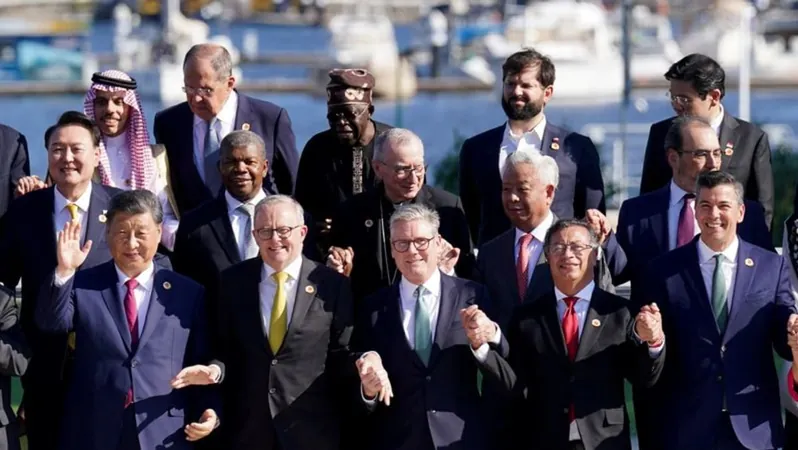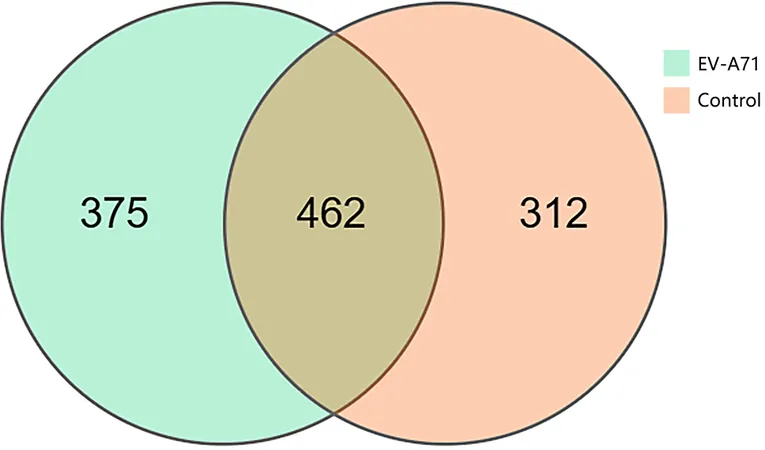
G20 Summit: A Disappointing Step Back for Climate Action and the Fight Against Hunger
2024-11-19
Author: Mei
The recent G20 summit held in Brazil has left many analysts feeling disheartened, with critics highlighting a glaring lack of concrete action on pressing global issues such as climate change and hunger. John Kirton, a political scientist and director of the G20 Research Group at the University of Toronto, characterized the joint declaration from the summit as “less-than-expected” and labeled it “disappointing.”
Despite the summit's potential to galvanize global economic powerhouses, it failed to generate new funding for an anti-hunger alliance that boasts support from over 80 nations. Brazilian President Luiz Inacio Lula da Silva inaugurated the two-day event by launching this ambitious coalition, aiming to eradicate hunger and poverty by 2030. Yet, Kirton pointed out the lack of commitment from the richest countries to contribute financially, stating, “There was nothing there.”
The declarations made in the summit failed to formally document pledges, such as some made by the United States, raising concerns that commitments could easily be forgotten. Kirton emphasized, "Without putting it down on paper, it can disappear into thin air," underscoring the urgency for tangible action on global commitments like alleviating hunger and advancing climate finance.
Climate Change: An Overshadowed Crisis
In addition to the shortcomings regarding hunger, the summit was also critiqued for not prioritizing climate change discussions. Kirton noted that leaders put forth a joint declaration before even convening to tackle the gravity of climate issues, marking this as a “missed opportunity.” Despite an agreement to establish actionable financial goals for supporting developing countries in light of climate challenges, observers ranged from hopeful to skeptical about the impact of these declarations, especially given the political climate in the U.S.
The anticipated transition from President Joe Biden to incoming President Donald Trump raises concerns regarding the future of U.S. commitments to global climate finance. With Trump’s previously stated views labeling climate change a "big hoax," many analysts believe his administration might roll back progress made by previous leaders who strived to address the climate crisis.
A Shift in Global Leadership Dynamics
Alongside the emphasis on hunger and climate action, the summit also demonstrated the evolving role of the G20 in addressing geopolitical tensions. Leaders collectively expressed deep concern about humanitarian crises stemming from conflicts in Ukraine and Gaza, a testament to the group's expanding responsibilities beyond purely economic issues.
Despite this, the vague phrasing regarding Ukraine’s situation did little to clarify the group's stance on Russia’s involvement, which many hoped would be addressed more decisively. Political analyst Joe Siracusa noted that emerging powers within the Global South, including India, Brazil, and South Africa, are beginning to shape discussions and influence the direction of the G20, suggesting a notable shift towards a more multipolar world.
The overall sentiment after the G20 summit reflects a need for more robust action and accountability in addressing critical global issues. As global leaders head towards the upcoming COP29 climate talks in Azerbaijan, the question remains: will they rise to the occasion, or continue to fall short in their commitments? Only time will tell whether this summit’s disappointing outcomes can serve as a wake-up call for future cooperation in the face of existential threats.


 Brasil (PT)
Brasil (PT)
 Canada (EN)
Canada (EN)
 Chile (ES)
Chile (ES)
 España (ES)
España (ES)
 France (FR)
France (FR)
 Hong Kong (EN)
Hong Kong (EN)
 Italia (IT)
Italia (IT)
 日本 (JA)
日本 (JA)
 Magyarország (HU)
Magyarország (HU)
 Norge (NO)
Norge (NO)
 Polska (PL)
Polska (PL)
 Schweiz (DE)
Schweiz (DE)
 Singapore (EN)
Singapore (EN)
 Sverige (SV)
Sverige (SV)
 Suomi (FI)
Suomi (FI)
 Türkiye (TR)
Türkiye (TR)